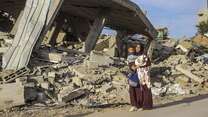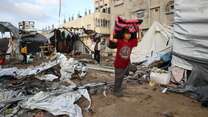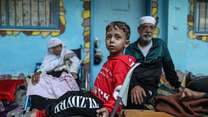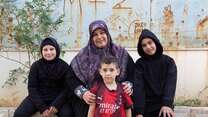The ongoing conflict, including fighting, airstrikes and siege are having a devastating impact on civilians and civilian infrastructure in Gaza, and the humanitarian situation is getting direr every day. Severe restrictions on humanitarian aid delivery mean essential items needed for survival, such as medical supplies, food and clean water are not getting into Gaza at the levels required.
The IRC is calling for all parties to agree to an immediate and lasting ceasefire as envisaged by UN Security Council Resolution 2735. A ceasefire is the only way to fully protect Palestinian lives, secure the release of hostages taken from Israel by Hamas and other armed groups, and safely scale-up humanitarian assistance and service delivery. While fighting continues, all parties must adhere to international humanitarian law which demands protecting civilians and the infrastructure they depend on to survive. The IRC is also calling for a humanitarian reset to deliver an immediate and significant scale up of humanitarian aid. This includes immediate action to: Open all land border crossings to goods and personnel; streamline inspection processes and list of permitted supplies; facilitate eased entry of humanitarian and healthcare staff; ensure safe movement for all humanitarian and healthcare workers and fully reinstate critical services like water, power, and fuel supplies.
As of 3 December 2024, Israel’s offensive in Gaza has killed 44,786 Palestinians and injured more than 106,000, while more than 10,000 are reported missing and likely buried under the rubble. Approximately 80% of Gaza's territory remains under forced displacement orders by Israeli forces, with 1.9 million people, or 90% of the total population, having been internally displaced multiple times during the past year.
Palestinians in Gaza are facing the combined effects of a lack of critical resources, collapse of public order, and worsening weather conditions. Without adequate humanitarian assistance, Gaza has become “unfit for human survival,” as Joyce Msuya, the acting UN Under-Secretary General for Humanitarian Affairs told the UN Security Council in November.
An average of only 65 humanitarian trucks per day entered Gaza in November, well below the 500 humanitarian truckloads per working day allowed before 7 October 2023, which were already insufficient to meet the needs of the population. In the same period, commercial supplies have come to a near halt.
Attacks on aid workers have continued: on 30 November alone, three separate Israeli airstrikes killed a Palestinian soup kitchen chef feeding hundreds of families in the besieged Beit Lahia, one Save the Children staff member and three staff from World Central Kitchen, pushing the latter to pause its operations altogether. The total confirmed death toll among humanitarian workers since 7 October 2023 now stands at 343.
Meanwhile, heavy rains hit the Gaza Strip on 25 November, marking the start of the winter season. The worsening weather conditions are expected to affect more than 1.6 million people living in makeshift shelters, including half a million in flood-prone areas. In August, OCHA developed a comprehensive winterization plan targeting 2.1 million people and requiring US$242 million, but its implementation is being slowed down by a lack of sufficient funding, and a lack of facilitation by the Israeli authorities to ensure the entry of supplies and equipment.



